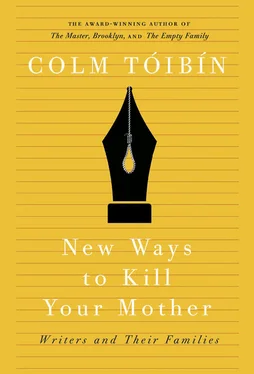When it came to the matter of boxing, for example, a subject that would thrill many of his heterosexual colleagues, he claimed to know nothing. Instead, using the full force of his homosexuality, he wrote beautifully about Floyd Patterson and his fight with Sonny Liston in 1963, studying the state of the two men’s souls and the intricacies of their auras with an erotic intensity. Of Patterson, he wrote:
And I think part of the resentment he arouses is due to the fact that he brings to what is thought of — quite erroneously — as a simple activity a terrible note of complexity. This is his personal style, a style which strongly suggests that most un-American of attributes, privacy, the will to privacy; and my own guess is that he is still relentlessly, painfully shy — he still lives gallantly with his scars, but not all of them have healed — and while he has found a way to master this, he has found no way to hide it; as, for example, another miraculously tough and tender man, Miles Davis, has managed to do.
Of Liston, Baldwin wrote:
He reminded me of big, black men I have known who acquired the reputation of being tough in order to conceal the fact that they weren’t hard… Anyway, I liked him, liked him very much. He sat opposite me at the table, sideways, head down, waiting for the blow: for Liston knows, as only the inarticulately suffering can, just how inarticulate he is. But let me clarify that: I say suffering because it seems to me that he has suffered a great deal. It is in his face, in the silence of that face, and in the curiously distant light in his eyes — a light which rarely signals because there have been so few answering signals… I said, ‘I can’t ask you any questions because everything’s been asked. Perhaps I’m only here, really, to say that I wish you well’… I’m glad I said it because he looked at me then, really for the first time, and he talked to me for a little while.
But in those same years he also spoke and wrote as though he were a founding father, in an unassailable position in his country, one of its central voices. In The New York Times in 1959 he wrote:
I think that there is something suspicious about the way we cling to the concept of race, on both sides of the obsolescent racial fence. White men, when they have not entirely succumbed to their panic, wallow in their guilt, and call themselves, usually ‘liberals.’ Black men, when they have not drowned in their bitterness, wallow in their rage, and call themselves, usually ‘militant.’ Both camps have managed to evade the really hideous complexity of our situation on the social and personal level.
In the same year, in reply to a question about whether the 1950s as a decade ‘makes special demands on you as a writer’, he adopted one of his best tones, lofty and idealistic and filled with candour, while remaining sharp and direct and challenging: ‘But finally for me the difficulty is to remain in touch with the private life. The private life, his own and that of others, is the writer’s subject — his key and ours to his achievement.’ Henry James would have been proud of him.
(The pride worked both ways. In Playboy in 1964 Baldwin managed to commandeer James as a member of his tribe, as someone who did not, as the vast majority of Americans did, spend his life ‘in flight from death’. He compared a passage from a letter James wrote to a friend who had lost her husband — ‘Sorrow wears and uses us but we wear and use it too, and it is blind. Whereas we, after a manner, see’ — with these lines from Bessie Smith:
Good mornin’, blues,
Blues, how do you do?
I’m doin’ all right.
Good mornin’,
How are you?
Once more James would have been proud, although it should be added that in his lifetime or in the years after his death he and his followers were not ever fully aware that what he was really doing was singing the blues.)
In 1959 also, in a paper called ‘Mass Culture and the Creative Artist’ given to a symposium, Baldwin concluded:
We are in the middle of an immense metamorphosis here, a metamorphosis which will, it is devoutly to be hoped, rob us of our myths and give us our history, which will destroy our attitudes and give us back our personalities. The mass culture, in the meantime, can only reflect our chaos: and perhaps we had better remember that this chaos contains life — and a great transforming energy.
He was, in these years, moving himself carefully to the centre of the debate, refusing a role, offered to him always, as spokesman for a minority, to be listened to only when that minority grew restive or dangerous or newsworthy.
During the 1960s, the voice Baldwin used in his journalism grew less ambiguous, however, more strident, especially when he was addressing a black audience. In a speech he gave to the Student Co-ordinating Committee in November 1963, after the Kennedy assassination, for example, he began:
Part of the price that Americans have paid for delusion, part of what we have done to ourselves, was given to us in Dallas, Texas. This happened in a civilized nation, the country which is the moral leader of the free world, when some lunatic blew off the President’s head. Now, I want to suggest something, and I don’t want to sound rude, but we all know that it has been many generations and it hasn’t stopped yet that black men’s heads have been blown off — and nobody cared. Because, as I said before, it wasn’t happening to a person, it was happening to a ‘nigger.’
Two years later, in an angry essay about black history, he saw no possibility of change, merely excuses for change.
In the meantime ladies and gentlemen, after a brief intermission — time out for one or two committee reports, time out for an antipoverty pep talk, time out to make a Vietnamese child an orphan and then lovingly raise him to love all our works, time out for a White House conference, time out to brief and augment the police forces, time out to buy some Negroes, jail some, club some, and kill some — after a brief intermission, ladies and gentlemen, the show begins again in the auction room. And you will hear the same old piano, playing the blues.
At other times, he seemed to be amusing himself by preaching to the white population, insisting that whites, in fact, were the group most in need of freedom from tyranny. In 1961 he wrote:
There is a great captive Negro population here, which is well publicized, and what is not known at all, is that there is a great captive white population here too. No one has pointed out yet with any force that if I am not a man here, you are not a man here. You cannot lynch me and keep me in ghettos without becoming something monstrous yourselves.
In Playboy in January 1964 he wrote: ‘What I’m much more concerned about is what white Americans have done to themselves; what has been done to me is irrelevant because there is nothing more you can do to me. But, in doing it, you’ve done something to yourself. In evading my humanity, you have done something to your own humanity.’
In an essay called ‘The White Problem’, also published in 1964, he sneered at the icons of white America, insisting that the difference between white and black in America was close to the difference between foolishness and seriousness, childhood and maturity:
In this country, for a dangerously long time, there have been two levels of experience. One, to put it cruelly, but, I think, quite truthfully, can be summed up in the images of Doris Day and Gary Cooper: two of the most grotesque appeals to innocence the world has ever seen. And the other, subterranean, indispensable, and denied, can be summed up in the tone and face of Ray Charles. And there never has been in this country any genuine confrontation between these two levels of experience.
Читать дальше












